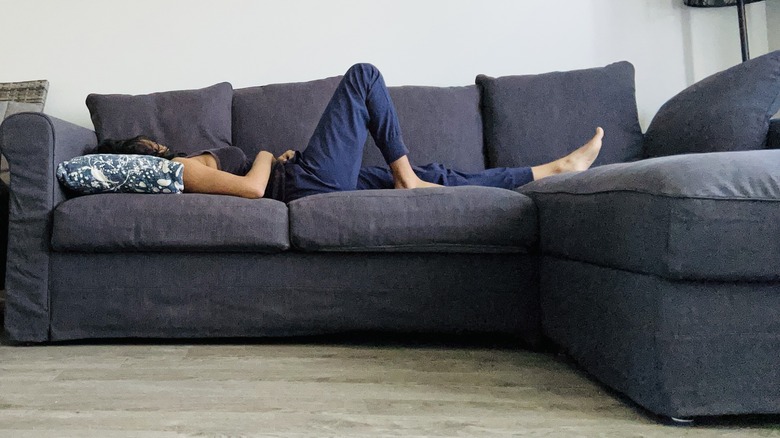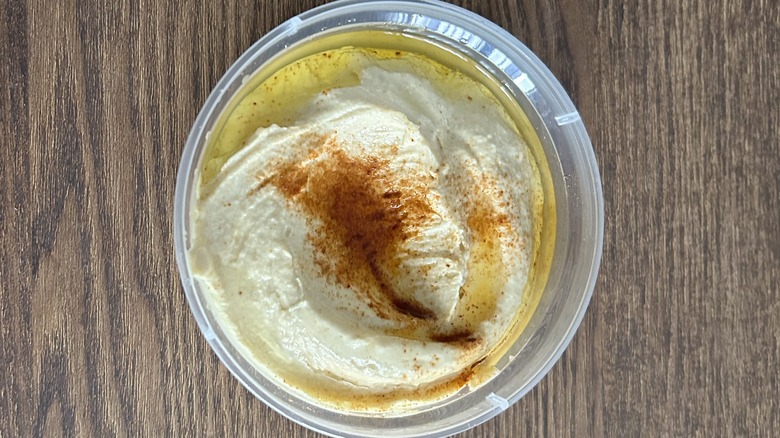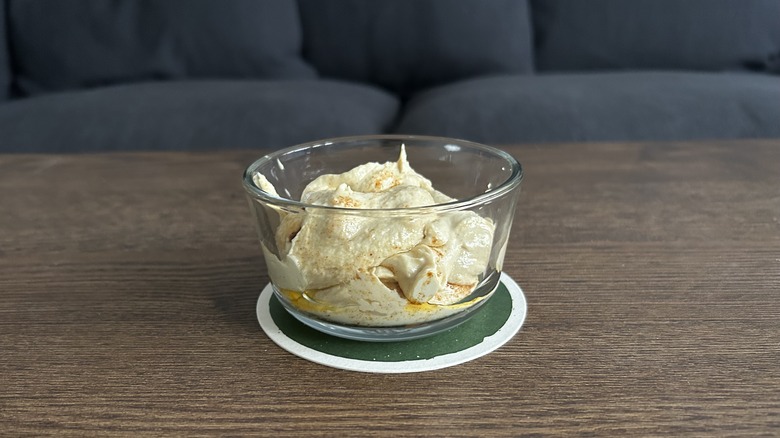Can Eating Hummus Really Help You Sleep? We Put It To The Test
Until I moved to Atlantic Canada, I was oblivious to short days during winter and the long nights of spring and summer. Having to wind down at 4.30 p.m. when the sun makes an early exit is a lot easier than trying to get relaxed when the sun is up till 10 p.m. The latter is what I'm currently dealing with (side note: need more blackout curtains).
It didn't take me long to start scrolling on the internet for things that could be ruining my sleep. Very quickly, I was in a rabbit hole filled with amusing suggestions. From naked sleeping to an easy muscle hack to put me to sleep, the online portals didn't disappoint. One particular hack, however, appealed to me because of its convenience — eating hummus to fall asleep.
Hummus is apparently a popular sleep-inducing food, per experts. The main ingredient in this dish — which apparently both the Middle East and Greece like to claim as their own — is chickpeas. Chickpeas contain tryptophan, an amino acid that is involved in the production of various proteins, enzymes, and neurotransmitters, including serotonin. Serotonin is known as the "feel good" chemical. It is also thought to promote quality sleep. Surprisingly, this hack seemed to work for me.
Consuming hummus before bed put me right to sleep
I had very little of the "rolling around and lying awake for hours" experience on the night I tried this hack. Here's how it went.
Let me preface this by saying — I wouldn't call myself a fan of hummus. In fact, I can count on one hand the number of times I've even tried the dip. But science (and sleepless nights) called for sacrifice, so I ordered myself a 12-ounce dish of this chickpea goodness from a Lebanese restaurant I frequent. The dish looked appetizing enough when it arrived but I didn't eat all of it. It came with a serving of pita bread. Being the health-conscious person I am, I decided to have this for dinner instead of indulging in late-night snacking. With dinner completed by 7 p.m., I proceeded to draw the curtains closed in the apartment, a futile exercise I engage in just for peace of mind.
Once 10 p.m. rolled around, which is my usual bedtime, I was admittedly a lot sleepier than I had been the day before. My mind, however, was trying to find other possible reasons for this. Some of them included — "I'd completed a 6K walk the previous day," "I had worked out the day before that," and finally, "I'm just more tired than I was the entire last week." Whatever the reason, though, I fell asleep a lot sooner and woke up feeling quite refreshed. Was it the hummus?
Hummus and sleep quality: The science
There are a few different ingredients that go into hummus. While chickpeas are the star, there's also tahini, garlic, lemon juice, cumin, salt, and olive oil.
Serotonin, produced with the help of the tryptophan in hummus is thought to be involved in the production of melatonin, popularly known as the sleep hormone. Even tahini (made from toasted ground sesame seeds) contains tryptophan. Additionally, hummus contains vitamin B6, which according to board-certified integrative medicine physician Dr. Taz Bhatia (via YouTube), "is an important micronutrient that balances all the different sleep neurotransmitters." Other sleep-promoting nutrients in this dip include its healthy fat, protein, and fiber content. They help you sleep better by keeping you full for longer. For those who wake up at night with midnight munchies, this is good news.
Chickpeas are a good source of magnesium. If you want to sleep for longer and wake up feeling refreshed instead of tired, magnesium can help in that department too. Magnesium actually performs a few different roles that help ensure you're getting the rest you need at night. The mineral is involved in regulating a neurotransmitter that calms your nervous system, otherwise known as gamma-aminobutyric acid, or GABA. It also promotes muscle relaxation and cortisol reduction.
Would I recommend the hummus hack to sleep faster? Yes, most definitely. I would suggest making the stuff at home or opting for ones that don't contain artificial colors, preservatives, or added sugars and oils. If you want a more "physical" hack for falling asleep faster, however, you can check out the drunken monkey movement for better sleep.


